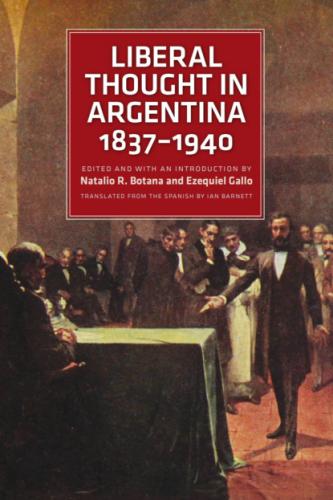[print edition page viii]
[print edition page ix]
| Introduction |
Tulio Halperín Donghi wrote in “Liberalism in a Country Born Liberal” that liberal ideas have had undeniable importance in Argentina since its independence.1 The origin of the liberal tradition is thus an integral part of the origin of the country, a trait common to the Spanish American nations that came into being during the turbulent period after the fall of the Spanish Empire in America.
By 1810, the writings of such figures representative of liberal thought in the River Plate as Manuel Belgrano, Juan Hipólito Vieytes, and Mariano Moreno already provided precedents. Once the independentist movement was under way, these writers were joined by the likes of Gregorio Funes, Bernardo de Monteagudo, Bernardino Rivadavia, and Valentín Gómez.
Two main features stand out in this set of ideas: first, the combination of classical liberalism in connection with agriculture, trade, and industry, on the one hand, and republicanism after the principle of monarchic legitimacy, on the other, waned in the space of a few years; second, repeated efforts between 1810 and 1830 to translate these ideas into a stable institutional framework and a constitution respected by the armed factions failed. The result was a political system of quasi-independent provinces that formed a primitive confederation without a representative congress that was dominated by the dictatorial regime of Juan Manuel de Rosas. In the province of Buenos Aires, Rosas reserved for himself the management of foreign affairs and tax control of Argentina’s only overseas port.
Over this twenty-year period, the liberal opposition to Rosas—most
[print edition page x]
of its proponents in exile—developed a political philosophy that culminated, between 1853 and 1860, in the approval of a constitution. That constitution, with a succession of reforms, has remained in effect to the present day. Liberal principles from U.S. and European traditions have played a key part in it.
The Constitution marks an important political and intellectual divide in Argentina, and for that reason we have decided to open this anthology of texts at that precise moment. This compilation presents texts, organized chronologically, in five chapters that reflect the stages of the rise, heyday, and decline of liberalism in Argentina.
I. LIBERALISM DURING THE DICTATORSHIP OF ROSAS (1837–1850)
In 1847, Juan Bautista Alberdi published La República Argentina, 37 años después de su Revolución de Mayo (The Argentine Republic 37 years after the May Revolution) in Chile.2 In it, Alberdi developed a strategy for the institutional development of liberal thought in Argentina. This strategy may perhaps be summarized in James Madison’s judgment in Federalist No. 51 (1788): “In framing a government which is to be administered by men over men, the great
